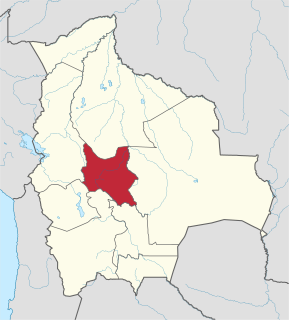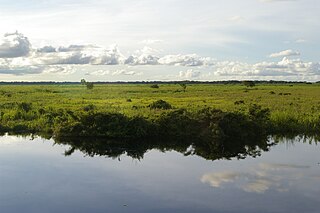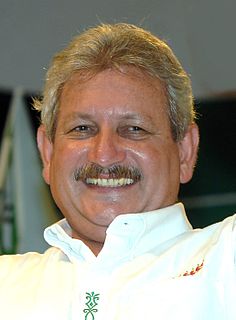
The politics of Bolivia takes place in a framework of a presidential representative democratic republic, whereby the president is head of state, head of government and head of a diverse multi-party system. Executive power is exercised by the government. Legislative power is vested in both the government and the two chambers of parliament. Both the Judiciary and the electoral branch are independent of the executive and the legislature. After the 2014 election, 53.1% of the seats in national parliament were held by women, a higher proportion of women than that of the population.

Cochabamba, from Quechua qucha or qhucha, meaning "lake", pampa meaning "plain", is one of the nine departments of Bolivia. It is known to be the "granary" of the country because of its variety of agricultural products from its geographical position. It has an area of 55,631 km². Its population in the 2012 census was 1,758,143. Its capital is the city of Cochabamba, known as the "City of Eternal Spring" and "The Garden City" because of its spring-like temperatures all year.

Elections in Bolivia gives information on elections and election results in Bolivia.

The Plurinational Legislative Assembly is the national legislature of Bolivia, placed in La Paz, the country's seat of government.

The Movement Without Fear is a progressive political party in Bolivia. MSM was founded on March 1, 1999.

The National Unity Front is a political party in Bolivia. It was founded in late 2003 by Samuel Jorge Doria Medina Auza, who had broken with the Revolutionary Left Movement earlier that year. It has thirty six members of the Chamber of Deputies in the Plurinational Legislative Assembly. Despite its substantial share of the urban vote, and sixteen former mayors, it does not control any city halls or governorships. The party is closely identified with Doria Medina's cement company Sociedad Boliviana de Cemento (Soboce).

Municipalities in Bolivia are administrative divisions of the entire national territory governed by local elections. Municipalities are the third level of administrative divisions, below departments and provinces. Some of the provinces consist of only one municipality. In these cases the municipalities are identical to the provinces they belong to.

The Media Luna or Media Luna Ampliada refers to a group of four departments – Santa Cruz, Beni, Pando, and Tarija – in Bolivia which became the geographic area of opposition to the national government led by Evo Morales and the Movement for Socialism (MAS).

The following outline is provided as an overview of and topical guide to Bolivia:

The Bolivian general election, 2009 was held on December 6, 2009, following a constitutional referendum held on 25 January 2009. Voters elected:
The tournament started in 1960, initially only champions from La Paz, Cochabamba, Oruro and Santa Cruz participated, in later years teams from other associations started joining the cup, and the tournament eventually also had runner-up's participating.
The Bolivian football league system is a series of interconnected leagues for association football clubs in Bolivia.
Municipal elections were held in Bolivia, on December 5, 1999, in all 311 municipalities across the country. The elections marked a milestone in the continuous deterioration of the political influence of the traditional parties. In 23 municipalities the mayors were elected through direct popular vote, in other municipalities the mayors were elected by the respective municipal council.
The first Bolivian judicial election was held on 16 October 2011. The national vote was held to elect magistrates to serve on the Supreme Tribunal of Justice, the Plurinational Constitutional Tribunal, the Agro-environmental Tribunal and members of the Council of the Judiciary. It was originally scheduled to be held on 5 December 2010, but officials of the National Electoral Court and of the MAS majority in the Plurinational Legislative Assembly delayed it. The vote will be the first time that a Latin American country directly elects its highest judicial officials.
The United Left was a political coalition in Bolivia, launched ahead of the 1985 presidential election. IU was founded on February 22, 1985, by Isaac Sandoval Rodríguez, Federico Hurtado and Pedro Monteciño. The United Left was composed of Eje de Convergencia, Revolutionary Workers Party Trotskyist-Posadist and other leftwing groups.
Bolivia held a parliamentary election in December 1920, electing a new National Congress.
The Supreme Tribunal of Justice, based in Sucre, is the highest court of ordinary jurisdiction in Bolivia. Its powers are set out in Articles 181–185 of the 2009 Constitution and the Law of the Judicial Organ. It was first seated on 2 January 2012.

The 2015 Bolivian regional elections were held on 29 March 2015. Departmental and municipal authorities were elected by an electorate of approximately 6 million people. Among the officials elected were:

The 2010–2015 Plurinational Legislative Assembly of Bolivia was the first class of the Bolivian legislature, also known as the Plurinational Legislative Assembly, to go by that name. The Assembly was controlled in both houses by the governing Movement for Socialism (MAS-IPSP), elected with a 2/3 supermajority, although some members later separated themselves from the majority. Just four incumbent members of the 2005–2010 Congress returned: Deputy Antonio Franco; Deputy Javier Zabaleta (MAS-IPSP/MSM); Senator René Martínez (MAS-IPSP), who was a deputy; and Senator Róger Pinto, previously of Podemos and now representing PPB-CN.

















